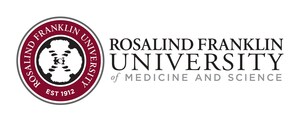NORTH CHICAGO, Ill., July 25, 2023 /PRNewswire/ -- Research scientists at Rosalind Franklin University of Medicine and Science and New York University Grossman School of Medicine are teaming up in an attempt to generate new therapeutic approaches to combat the onset of Alzheimer's disease (AD) in individuals with Down syndrome (DS), the most common chromosomal disorder and cause of intellectual disability.
While individuals with DS are living longer, in part due to advances in medical science, more than 50-75% will develop dementia as they age, with many experiencing symptoms by their 40s, according to the National Institute on Aging. The institute has awarded Chicago Medical School investigator Dr. Grace E. Stutzmann $916,777 in funding — part of a $2.4 million grant awarded to Grossman School of Medicine’s Dr. Stephen D. Ginsberg. The project involves a consortium with RFU, NYUGSOM and the Nathan Kline Institute.
"We feel this is a powerful study that will greatly enlighten our understanding of how individuals with Down syndrome transition to Alzheimer's through our combined strengths of transcriptomic analysis and neurophysiological mechanisms," Dr. Stutzmann said.
A professor and director of RFU's Center for Neurodegenerative Disease and Therapeutics, Dr. Stutzmann has long studied the early neuronal pathology that develops in AD.
Pathological hallmarks of AD include beta-amyloid and tau pathology, synaptic deficits, and neurodegeneration of key circuits underlying memory, attention and executive function. The extent to which these pathologies are found in DS are a significant component of the collaborative research project.
"While DS and AD phenotypes overlap in many respects," according to Dr. Stutzmann and Dr. Ginsberg, "the extent of shared pathophysiological mechanisms remains poorly understood. The knowledge gap is a potentially missed opportunity to arrest the onset of AD dementia in DS."
Dr. Stutzmann and RFU colleagues published a key AD paper in late 2022 in the scientific journal PNAS, which provides the groundwork for possible shared mechanisms with DS and aligns with differentially expressed gene pathways identified by Dr. Ginsberg in vulnerable cell types that underlie memory and executive function.
Ronald Kaplan, PhD, RFU executive vice president for research, commented: "We are pleased with Dr. Stutzmann's collaboration with Dr. Ginsberg in studying the linkage of DS and AD patients with the goal of new therapeutic alternatives."
A previous version of this release incorrectly stated RF’s portion of the grant as $1.8 million.
CONTACT:
Office of Marketing and Communications
Dan Moran
[email protected]
SOURCE Rosalind Franklin University of Medicine and Science
WANT YOUR COMPANY'S NEWS FEATURED ON PRNEWSWIRE.COM?
Newsrooms &
Influencers
Digital Media
Outlets
Journalists
Opted In






Share this article